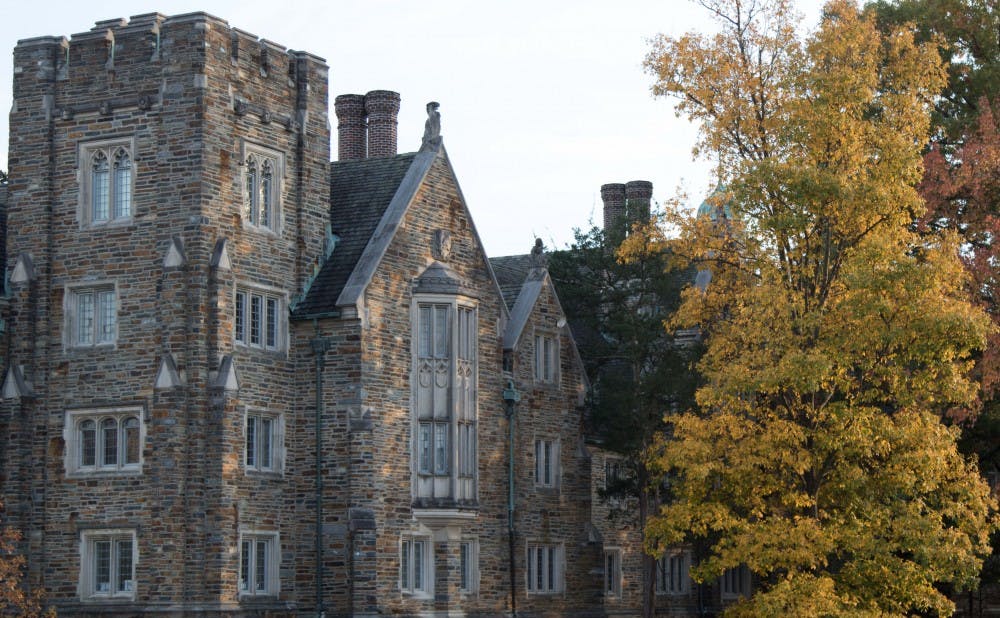A racially insensitive party invitation from the Alpha Delta Phi fraternity contained language that played up immigrant stereotypes, drawing backlash from students and campus groups.
The GroupMe message, sent May 2 to multiple group chats, read, “Need help crossing the border? Lucky for you ADPhi has a few too many Latinos who are extremely skilled at evading law enforcement,” according to a screenshot obtained by The Chronicle.
“Just don’t get deported,” the message ended.
The message included the address of the party, which was in North Carolina but near North Myrtle Beach, South Carolina, where many Duke students at the time were on their end-of-year beach week trip.
Screenshots of the GroupMe message quickly circulated on social media.
ADPhi president Cole Darrow, a senior, did not respond to multiple requests for comment.
When junior Anthony Salgado, president of Mi Gente, Duke's largest Latinx student organization, saw the message, his first question was, “Why?”
“So there’s this party happening in North Carolina versus [most students’ locations in] South Carolina. What did that have to do with deportation? It felt like you had to go out of your way to make that joke,” Salgado said.
Laura Poma Gomez, a junior and a member of the Lambda Theta Alpha Latin sorority, first saw the message on the night of May 2 at a dinner with members of her sorority; La Unidad Latina, a Latin fraternity; and Phi Beta Sigma, a historically Black fraternity.
A first-year who received the message in a group chat shared it with Poma Gomez, asking for advice. Poma Gomez immediately stood up and showed the message to the people at dinner.
“It was immediate shock, outrage and really, disgust,” Poma Gomez said.
While Poma Gomez had heard about previous similar incidents, “I had never seen something this blatant in my own time [at Duke],” she said.
“COVID put a lot of this stuff underground, so being able to see this right now, I understand that, actually, yes, our community still is very much under attack,” she said. “A lot of our students can’t feel comfortable on campus, but even going away for beach week, trying to have a relaxing time in a space of Black and Brown people, we still had to face this.”
But Ana Trejo, Trinity ‘22, who was also at Myrtle Beach at the time of the message, wrote in a message to The Chronicle that “she was disappointed but not the least bit surprised.”
Trejo was one of the students who painted the Latinx Heritage History Month mural on the East Campus bridge in 2018. A day after, it was found defaced.
“My initial thought was, ‘Wow that really came full circle’... Now my senior year, my beach week was tainted (once again!) by racist actions,” Trejo, the former president of Define America, wrote in a message.
Salgado said the consensus among members of campus cultural groups was that this behavior was expected from Greek life.
“I think one reaction is like, ‘Oh, you’re taking it too seriously’ or ‘Oh, it’s not that deep,’” he said. “But for a lot of people, it is that deep.”
Trejo described the message as “racist, classist, anti-immigrant and completely unnecessary.”
“They knew what they were doing when they sent that message, and we are tired of making excuses for alleged ‘ignorance,’” Trejo wrote.
Get The Chronicle straight to your inbox
Sign up for our weekly newsletter. Cancel at any time.
The message comes at a time when “undocumented students have told me that they felt very vulnerable, very alone on campus because they don’t know a lot of students like them,” Salgado said.
“If someone was bold enough to throw this joke in a chat, they obviously don’t care about [the undocumented student] population, but they also don’t really see this population as a big deal,” Salgado said.
When asked what kind of response he might want to see from ADPhi, Salgado explained that it’s difficult to demand anything from fraternities that have disaffiliated from Duke. Members of the Durham Interfraternity Council have no official connection to Duke, though they are still expected to follow all Duke policies and procedures.
“[Cultural group leaders] are tired. We’re human too. Every time we see one of these things, it hurts us, even if it’s not for our own group,” he said.
Poma Gomez recalled her friend telling her, “Nothing is going to change. This is what they do, this is what they’ve always done. And you’re just putting yourself in a line of fire at the end of the day [by speaking out].”
“That's a sentiment that's held by a lot of students of color and minority students on campus,” Poma Gomez said. “Really just a sense of hopelessness.”
In response to the message, a collective of 23 campus cultural organizations released a list of demands to the Durham IFC on Thursday. They called for systems “to allow confidential peer reporting” and a “visible counter of racial bias incidents,” a “peer judicial board,” bystander training, equity and bias training and a public list of executive members.
ADPhi most recently came under fire in February, following an allegation from Durham residents that an ADPhi member was caught urinating on a house. Durham residents circulated a petition calling to ban fraternities from residential neighborhoods and called members of the fraternity residing at five addresses on Chapel Hill Road—nicknamed the Compound—a “public nuisance.”
Darrow wrote in an email to The Chronicle in February that “numerous” allegations in the petition predated current members of ADPhi and that the fraternity has taken action to prevent the issues mentioned, including “proactively engaging with the neighbors.”
Kathryn Thomas contributed reporting.

Milla Surjadi is a Trinity junior and a diversity, equity and inclusion coordinator of The Chronicle's 119th volume. She was previously editor-in-chief for Volume 118.

